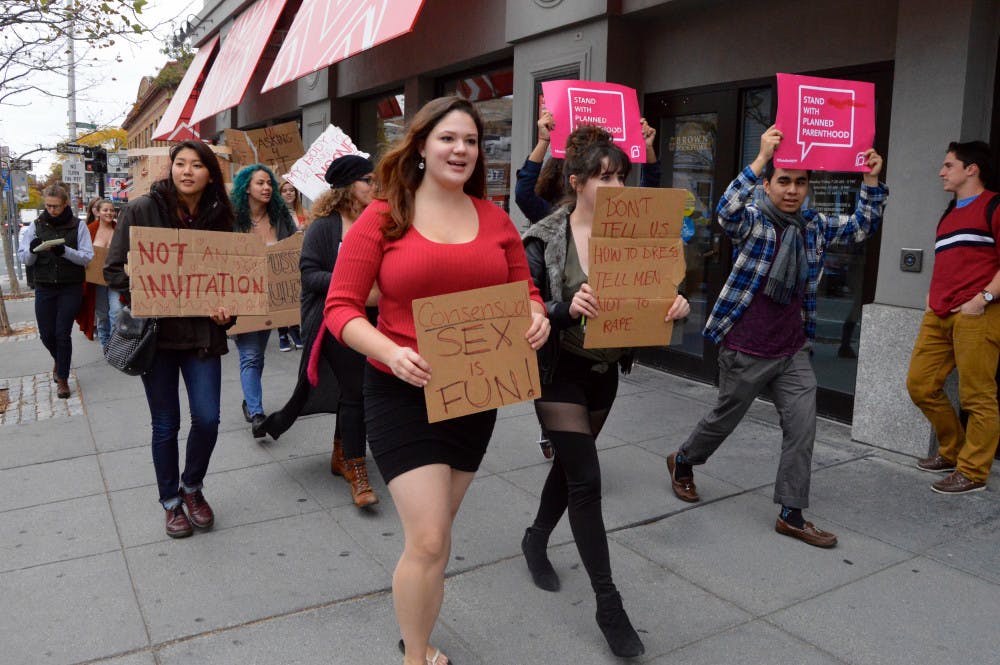In attire ranging from winter coats to completely topless, about 20 Rhode Island School of Design students marched through 40-degree weather at 11 a.m. Saturday carrying picket signs as part of the RISD Sexual Health and Relationship Educator's “Walk of No Shame.”
“Consensual sex is fun!” said Emmeline Franklin, co-president of SHARE, in her welcome to the event with Co-President Lucy Crelli. They led participants who carried signs bearing statements like “I have sex for fun, and I have no shame,” “Not an invitation” and “My pussy, my rules.”
The international SlutWalk movement, which protests victim-blaming in cases of sexual assault and slut-shaming — condemning women for sexual activity — inspired Franklin and Crelli to stage SHARE’s first public event “with a bang,” Franklin said. The co-presidents founded SHARE in spring 2015 to cultivate a more sex-positive campus environment, Crelli said.
Participants walked, danced and swayed to songs like Salt-N-Pepa’s “Let’s Talk About Sex” and The Lonely Island’s “I Just Had Sex” blasting from a rolling speaker trailing the group. Demonstrators cheered at each new city block.
The group passed staring men, a full college tour on the Main Green and a few applauding students on the Ruth Simmons Quadrangle. Franklin said honks from multiple cars on Thayer Street left her unsure whether drivers intended solidarity or were thinking “Hey, it’s girls with boobs!” Either way, demonstrators cheered back.
Spectator support was a highlight of the day, said Nicole Guggino, a Rhode Island College student and Planned Parenthood intern. One Thayer Street pedestrian shouted after the group, “Sex matters! Sex matters!” A young man popped out of the door of Nice Slice to dance along as the group passed. Several restaurant-goers waved behind windows.
“I was a little nervous … that there might be some people who would yell some offensive things, but they didn’t, and I was really happy about that,” Guggino said.
The walk was “a moment of revelation for myself,” Alexa Ko, a member of RISD’s Queer Student Association, told The Herald. “It hit me (that) I shouldn’t feel ashamed because it’s not unusual for male-bodied people to reveal their top.” Feeling safe in the group inspired her to “slowly start stripping off,” she said. “I’m going to be way more comfortable after this with my body.”
The demonstrators gathered for a follow-up discussion in the living room of Thompson House, home to RISD’s Counseling and Psychological Services. With RISD Title IX support staff present, the students critiqued their “Walk of No Shame” and addressed a host of feminist issues.
Students shared personal experiences handling catcalls, which started for some at 12 years old. “Do you respond or not?” asked Claire Richey, a member of SHARE. “My mom (says) ‘Don’t antagonize them — I want you to be safe,’ but am I just supposed to let them talk to me like that?”
In addition to critiquing the common conflation of feminism with misandry, the group discussed the need to create intersectional feminism in the face of white feminism. “If you combine issues, it creates a bigger audience,” said Kelly Eriksen, a member of SHARE.
The group’s failure to distinguish between a woman and a uterus-owner made the conversation feel exclusive, said Laura Bejarano, a RISD student and a member of Brown’s Gender, Power and Sexuality — formerly Providence FemSex — workshop. “It’s interesting to question the use of gender in a conversation. Do you really need to say ‘he’ or ‘she’?”
The discussion “didn’t feel relevant to me,” Bejarano told The Herald, adding that the group seemed receptive when Bejarano voiced concerns. “I appreciate people are interested in fixing their vocabulary.”
The group also addressed the danger of “internal downplay,” or weighing one issue over another. For example, “A friend didn’t feel her sexual assault was important because it wasn’t rape,” Franklin said.
Before the walk, participants gathered on RISD’s Nickerson Green to make picket signs and pose with whiteboard messages for SHARE’s photo campaign, styled after “Project Not Asking For It,” a campaign in which people assert that their outward appearances never make unwanted sexual attention acceptable. In addition, Planned Parenthood hosted an information booth providing free contraceptives and picket signs.
To incorporate the community beyond RISD for the event, SHARE collaborated with Brown, Johnson and Wales University, Rhode Island College, Planned Parenthood, the Center for Sexual Pleasure and Health, the RISD Title IX Initiative and the RISD Center for Student Involvement, Franklin said. “The great thing about this is (it’s) more powerful as a collaboration,” said Lisa Hoopis, adjunct professor of human sexuality at Rhode Island College.
Despite lower attendance than expected, the walk was “still really successful and awesome,” Franklin said. “Even if just one person saw our signs and felt empowered or connected or understood, if one survivor saw a ‘Still not asking for it’ sign, I hope that even that small impact means a whole lot.”
“Walk of No Shame” marks Providence’s second SlutWalk — the first came to Burnside Park in 2011.
Looking ahead, SHARE aims to bring bystander intervention programming, documentary screenings and a sex therapist to RISD, Crelli said.





